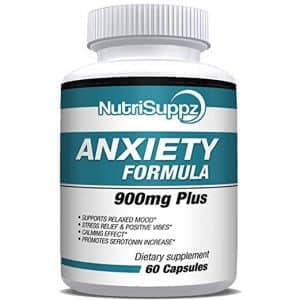People with dementia can be upset or get anxious quite easily. It is also normal for people with such a condition to be rather restless and have issues sleeping. This is why you find them pacing up and down.
Anxiety is an issue that makes such elderly patients not be able to handle the daily routines and they can become very harmful to their loved ones or their caregivers. The best anti-anxiety medication for elderly with dementia should be administered to help them cope.
One of the greatest triggers of anxiety in such patients is change. It may be because the routine changes, or she /he is in new surroundings, or that he/she is surrounded by new faces.
It may also be because of fatigue or fear. Anxiety can also be because of infections or other underlying medical issues. If such a thing happens to a loved one and you are not able to point out the reason for the issue, you should seek help from a doctor to establish the real cause.
Some caregiving tips
So as to lessen the kind of agitation being experienced, you may try a routine that is simple or dealing with the things that caused the anxiety in the first place. Some of the things you can try out include:
- A calm space for the patient
You should remove any kind of background noise that is originating from a radio or a TV. Deal with clutter, do away with it, and make the tasks that the patient has to deal with every day as easy as you possibly can.
- Find out if there are physical reasons making the patient anxious
You should take time to find whether there are any physical reasons that are creating the agitation in the first place. This can include, thirst, hunger, being too cold or hot, and even need to use the bathroom.
- Exercise
Exercising can help reduce stress and anxiety in the patient. You can allow the patient to take a walk or handle some gardening work depending on the stage of the illness. You may also encourage him/her to dance to his/her favorite music.
Medications that can be used to handle anxiety in elderly with dementia
One of the most difficult situations to deal with when handling a dementia patient is when they are acting anxious or agitated. These issues go beyond thinking and memory. These issues include things like:
⇒ Sleep disturbances
⇒ Disinhibited behavior, meaning the person can say or do things that are inappropriate socially speaking
⇒ Wandering and pacing
⇒ Agitation
⇒ Irrational beliefs, paranoid behaviors, and delusions
These neuropsychiatric symptoms can be hard to deal with and they are one of the most challenging things that caregivers can deal with when caring for dementia patients. There is no specific drug that can be used for the treatment of dementia, but development can be slowed down and symptoms treated.
What can be done?
Due to the fact that such behaviors can be rather stressful to those providing care and those who are ill, many people wonder if there are medications that can make things better and the answer can be given as may be.
When you are considering medications to use on an elderly person with dementia, you will have to also consider the side effects that may occur because there are many risks involved. It is therefore important to try anxiety treatment without medication.
It is however common for such patients to be given antipsychotics in such a case. This is chemical restraint. In most cases, tranquilizing medications such as the antipsychotics can help in calming the behaviors, but there are many risks and side effects that may occur.
Sometimes the medications can be prescribed prematurely, which is risky since they may be given in excess. It is important to first establish why the behavior is happening in the first place and consider non-drug options before anything else. It is therefore not recommended to give the drugs at first until the real issue behind the behavior has been established.
Types of medication to treat anxiety
There are certainly cases when you will have to administer medications to a patient with dementia. Avoid getting anxiety medication over the counter since there are lots of things that need to be assessed.
There are different best over the counter anxiety medication that can be helpful to patients dealing with anxiety, but most of them are not recommended for dementia patients. Most common drugs that can be administered to the patients include:
Antipsychotics
These drugs were meant for treatment of schizophrenia and other diseases that cause psychosis symptoms. The drugs that fall under this category especially used older adults include drugs like:
- Risperidone
- Haloperidol
- Olanzapine
- Quetiapine
The most common effect of such drugs is sedation and they tend to calm that aggression and agitation by causing the sedating effect. These drugs can also reduce symptoms associated with psychosis such as paranoid beliefs, hallucinations, and delusions, but they may not correct them completely where dementia patients are concerned.
Risks associated with the drugs depend on the dose taken and can include increased falls, a decrease in cognitive function, and extrapyramidal symptoms, which have to do with tremor and stiffness.
In clinical trials, it has been seen that the symptoms actually improve after the drugs are administered, but other side effects may follow. When such drugs are administered in elderly people who have dementia, they are at a higher risk of developing a stroke or death.
Benzodiazepines
In this category, people are able to relax rather quickly. The drugs in this category are great for panic attacks, for anxiety, insomnia and for sedation. The bad thing about them is that they can be habit forming making the dementia patient be dependent on them.
The drugs in this category that are used in elderly persons with dementia may include:
- Clonazepam
- Alprazolam
- Diazepam
- Temazepam
- Lorazepam
The usual effects of these drugs are very similar to how alcohol affects the brain. This is what causes sedation and relaxation. The different drugs last for different intervals within the body of the elderly person. Some last for only a short time while others can have a longer life.
The risks that are associated with the mediations are the fact that they can create dependence, both psychological and physical. Some risks that may get worse, where older adults are concerned to include:
⇒ Risks of falling since the elderly person can be disinhibited or may become restless
⇒ Confusion
⇒ Delirium
⇒ Cognitive decline
Taking the drugs regularly may also cause the dementia symptoms to take a turn for the worst, especially when the drugs are reduced or scrapped completely. This is because anxiety and discomfort can be experienced because of the withdrawal. This can affect behavior and thinking.
Mood stabilizers
These include some medications that are usually meant for seizures and they usually reduce the excitability of the brain. The drugs that are most commonly used in this category include Valproic acid under the brand name of Depakote for the elderly. It comes in short and long acting kinds of formulations.
The effect usually depends on the dosage administered, but it can be generally sedating. If an elderly person is given this medication. The blood levels have to be monitored periodically. Even if the level is acceptable, there are side effects that can still occur and they may include:
- Gastrointestinal issues like diarrhea, vomiting, and nausea
- Tremor and other symptoms that are common with parkinsonism
- Difficulty balancing and walking
- Dizziness
- Worsened thinking and confusion
After clinical trials, the drugs were seen to improve anxiety in some patients with dementia.
Anti-depressants
Most of the drugs in this category have benefits for anxiety. However, you should note that such drugs could take weeks and sometimes months before they achieve the full effect on anxiety and depression symptoms.
Some of the drugs that are usually used on dementia patients, especially when they are elderly. SSRI antidepressants (Selective serotonin reuptake inhibitor) are usually used. Drugs under this category include:
⇒ Citalopram (celexa), escitalopram (Lexapro), and sertraline (Zoloft)
⇒ Paroxetine under the brand name Paxil. This drug is more of an anticholinergic than the other options and that is why some people may not give it to dementia patients.
⇒ Mirtazapine increases appetite and can increase sleepiness, especially when administered at bedtime.
⇒ Trazodone is an antidepressant even though it is a weak one and can be given just before bedtime to improve sleep.
The effects seen on anxiety may vary from one patient to the next, but they can be very helpful to certain individuals, even though it may take some time to see any kind of effect. The sedation at bedtime can help in sleep improvement as well as improvement in irritability, especially in the daytime.
Usually, the above antidepressants are well tolerated in elderly persons, especially when the administration is started at a low dose and then increasing it when the need arises.
Dementia drugs
These are drugs that have already been approved by the FDA so as they treat the thinking and memory issues that are associated with dementia.
In some cases, the drugs can help with some neuropsychiatric symptoms. It is always important to talk to a doctor before administering any drugs to an elderly person with dementia.
Natural anxiety supplements
Supplements should not be a replacement of prescription drugs or other therapies that the doctor may have approved. Some supplements are tolerated well, although there are issues that can affect the dosage used.
Talk to a doctor before using any anxiety supplement on an elderly person with dementia to be safe. Some include vitamin A, B complex, vitamin C, vitamin D, vitamin E, fish oil, GABA, L-thiamine, Magnesium, 5-HTP, and herbal supplements.
Some practical tips that can help you deal with anxiety in dementia patients
There are some tips that can really help, especially when it comes to medications meat to handle anxiety. Some of the things to remember include:
- Before you choose to medicate, first identify why the elderly person is getting anxious and what is making it worse. Try non-drug approaches before anything else.
- Consider treating constipation or pain because sometimes such issues can be overlooked in the patients. Since a dementia patient cannot be able to articulate the pain they are feeling, acetaminophen can be given. Titrate drugs can also be given so that the patient can have a softer bowel movement every couple of days.
- Some medications work better on certain individuals than others. as such, if you do choose to use medications, you may have to try different ones before you can find one what actually works
- Benzodiazepines and antipsychotics usually work quickly. However, they work mainly through chemical restraint and sedation. They should be kept on a low dose as much as possible.
- Benzodiazepines can increase falling risks than other drugs and can be habit forming. They may not help with paranoia, delusions, or hallucinations. For this fact, when geriatricians need something that acts fast, they would probably give antipsychotics instead of benzodiazepines.
- Even though the antidepressants take a longer time to work, they are well tolerated.
- Dementia drugs can also be tried out because they are well tolerated.
Implementing non-drug approaches
Non-drug methods are usually shown to be very effective when it comes to improvement of dementia related behaviors. However, the real issue comes when the implementation is required.
When there is an elderly person with dementia who is living at home, the paid helpers or family caregivers may have very limited energy to practice and learn the different behavior management kind of techniques.
Even with the risks associated with antipsychotics, the caregivers can be anxious and may want a quick relief for the people under their care.
In the residential facilities where dementia patients are housed, there is a variation on the training that the staff already have in dealing with the different non-drug approaches.
How to deal with dementia behaviors?
When your elderly loved one has not started taking anxiety medications, there are some tips that you can consider:
- Keep a journal: this will help you make an identification of the triggers of anxious and difficult behaviors. You should take the time to observe the patient. The journal can be very helpful, especially when medications have to be administered eventually. You can then note down the benefits and any side effects.
- De-escalate and redirect the behaviors: this is something that can be taught to you by the necessary bodies. There are many approaches that can be applied.
- Assess for constipation and pain: allow a doctor to handle this and then administer the best drugs for the issues especially in the elderly.
- Depression: it is important to find out whether your loved one is depressed.
- Consider drugs if the elderly person becomes very paranoid, aggressive or anxious. Also, consider drugs if the symptoms are causing them distress and making life difficult for caregivers.
- Talk about the risks associated with drugs with a doctor and discuss the same with close family members.
- Don’t start with a high dose.
- Monitor the patients and increase doses slowly so as to find the minimum dose required to keep the patient manageable.
Dementia medications to avoid
It is important to note that there are medications that can actually make dementia worse than it is. When dementia drugs are developed, they are meant to increase Choline levels, which is a chemical that is needed by brain cells to communicate with one another.
However, some drugs can decrease the levels of this chemical and end up worsening dementia and can result in agitation and confusion. They may also cause issues with urination, constipation and a dry mouth.
There are many ailments that can affect dementia patients and they need to be treated. The drugs may have a negative effect on the patient and so alternatives should be sought out.
The drugs
They include:
⇒ Benadryl: This is often found in cough syrups, allergy pills, and sleeping pills. You may need one dose of the drug when you have a reaction, but you can find other better choices.
⇒ Bladder pills like Oxybutynin, and Tolterodine
⇒ Trapezium helps when the patients urinate too often but can cause agitation and confusion. More measures that are basic should be taken, though, like not using caffeine and help the person use the bathroom after two hours. Give the patient some interesting activities.
⇒ Glycopyrrolate can dry secretions but may cause agitation and confusion.
⇒ Atropine should be used cautiously when a patient has dementia. This is a drug often used in patients in hospice so as to dry secretions but is not recommended unless the patient happens to be unconscious.
⇒ Amitriptyline: this is a medicine that was used in the treatment of depression but can also be used for irritable bowel conditions and neuropathy. For fewer effects, consider using Nortriptyline since the side effects are minimal.
⇒ Diphenoxylate is often meant for diarrhea and it may not have bad effects when used a few times. Regular use can lead to anticholinergic effects, which may be problematic in patients with dementia.
⇒ Steroids: these are medications that are meant to deal with inflammation can cause issues for elderly persons with dementia. Drugs like prednisone that are meant for the treatment of different lung diseases can cause agitation, insomnia, and confusion.
Conclusion
There is no known cure for dementia, although there are drugs that are used to alleviate the symptoms associated with the disease and slow down its progression. Dementia affects the brain and anxiety can be one of the symptoms that these changes can bring about.
As such, dementia anxiety treatment options should be carefully thought out. When a dementia patient is agitated, they may cause themselves harm and attempt to harm those around them. Dealing with such a situation can be very depressing for caretakers and close family members. It can change the way life feels and frustration is quite common. We have outlined different approaches that can be used to lessen anxiety in elderly patients with dementia.



